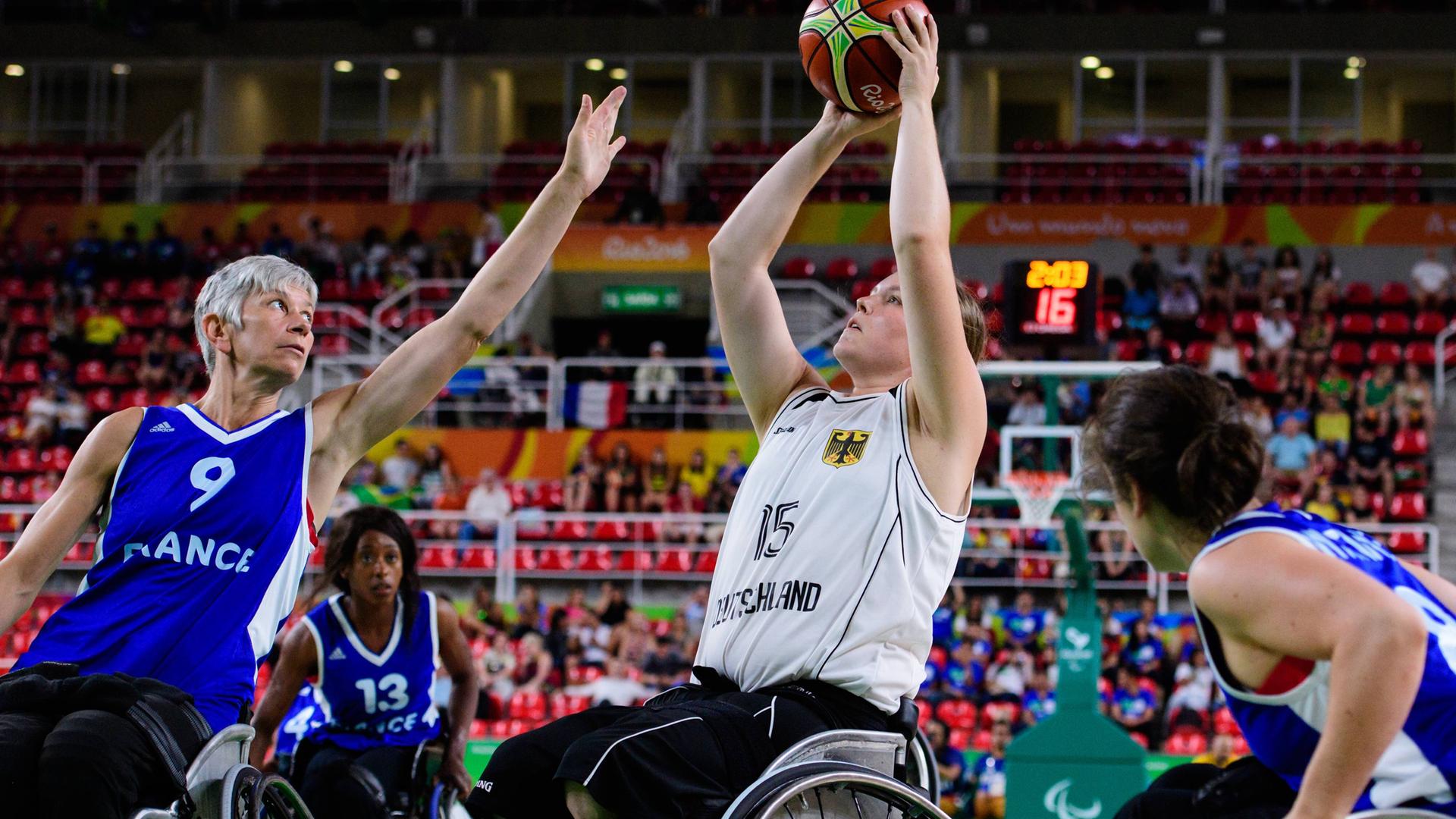Wheelchair basketball player Barbara Groß, here at the 2016 Paralympics, ended her career in 2021 due to the mental strain of the classification. (imago / Conny Kurth / imago sport photo service)
“Nice heel to toe, heel to toe,” exclaims Marion Peters. Para Athletics Talent Day at the Steigerwald Stadium in Erfurt. The athletically ambitious children and young people from the Christopherus School show what they can do here. “Jeremy, heel to toe! So this is just a balance test. This is also a test from the classification, but the children enjoy it. And we can already see what the conditions are like, for example cognitive development, the then show up in motor skills.”
The Talent Day is organized by the Thuringian Disabled and Rehabilitation Sports Association, which is looking for a sports club together with the children. Marion Peters is the national trainer in Para-Sport and is there out of curiosity about the youngsters. Spellbound, as if at some crucial contest, she watches the students stepping one foot in front of the other along a white line on the red tartan flooring. They are children with sporting ambitions and various physical and mental impairments who need support in their sporting careers in popular or competitive sports.
“For me it doesn’t matter whether someone has a handicap or not, for me it’s crucial that someone sets a goal and connects this sport with a certain goal,” says Peters.
Classification system in para sports is complicated
It is not that simple. The classification system in para sports is complicated. If you want to start in competitions, you have to be divided. The classification system first differentiates between physical, mental and visual disabilities. Depending on the characteristics, the allocation to the respective starting class follows. In the case of athletes with physical or mental disabilities, movement restrictions are checked in addition to medical examinations and psychological tests. But: Those who are unlucky fall through the cracks.
“Yes, of course, para-sport is very exclusive, not inclusive but exclusive,” says Karl Quade, gold medal winner in Seoul 1988 and long-time vice president of the German Disabled Sports Association DBS. The thought behind the many starting classes: create equal opportunities and exciting performance comparisons in the competitions. “It’s only bad if you’ve been involved for a long time, then there are changes in the classification and then you’re out.”
New IPC guidelines came into force in 2017
In 2015, the International Paralympic Committee, or IPC for short, passed new guidelines that have been in force since 2017 and have turned para-sport upside down like it hasn’t done in a long time. Quade: “There was a bit of wild growth in the run-up to the classification. It has become much, much more complex, but from my point of view much clearer and fairer.”
In fact, that’s a matter of opinion. Athletes who were no longer allowed to take part in the Paralympics after the restructuring see it differently, as Quade also knows: “There were of course a number of athletes in basketball, wheelchair basketball, wheelchair tennis who no longer fit into this pattern.”
An example: Suddenly the long-time German national player Barbara Groß with her so-called minimal disability, which means that she is not dependent on a wheelchair in everyday life, was no longer eligible to participate. The silver medalist had to go through a reclassification and lost her international starting permission in 2020 and then got it back after protests and official petitions. A year later she gave up her career. The wheelchair basketball player no longer wanted to expose herself to this “mental cauldron”, reported the magazine “Rollt”.
Revised classification rules expected in 2028
Because of such cases, it hails criticism to this day. The Paralympics star Andre Brasil, who also lost his starting permit, described the creation of the Paralympics regulations as non-transparent and even undemocratic. DBS Vice Quade disagrees and refers to a revision process that has just started again: “The classification code has now been called up again. The nations are asked where there is still a need for additional tax from your point of view? There are then panels of athletes, it There are panels of sports directors, and there these topics are discussed and debated in various rounds. The IPC doesn’t do it on its own, but they control a process of all members.”
Quade only expects a revised version of the classification rules for the Paralympics in Los Angeles in 2028, next year in Paris everything will remain as it is.
Neither Quade nor Marion Peters expect big changes in general. Peters, who works as a national trainer and classifier, wants to create fairer competition through even more accuracy: “My point of criticism is that we simply need better classification settings. We simply need the support of science. So, for example, we have been floating for some time also presented this topic of the classification center. With a scientific basis, that brain waves are measured, that spasticity is also measured objectively. I believe this topic of more objective measurement and assessment is what we have to work on in the future. “
More justice would mean more tests for athletes
More justice would mean more tests for the athletes. It’s a tightrope walk for everyone involved, because some athletes find the intensive and increasingly detailed examinations very stressful. But they are becoming more and more necessary to avoid fraud, says Peters. In recent years there have been repeated cases in which athletes were suspected of having cheated themselves into performance groups or having been divided into weaker performance classes by national classifiers to their advantage.
According to Peters, this is fraud: “Cheating! The DBS has now also gone there, I think it’s right, and has made all full-time employees obligated to prohibit any form of classification fraud and, if in doubt, to punish it. That’s new, that just came in the mail a week ago.”
